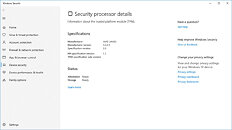Friday, June 25th 2021

Thanks to Windows 11, Scalpers Buy Out Add-on TPM 2.0 Modules
Most modern PC platforms include an fTPM (firmware trusted platform module) of some form. Those that don't, have a TPM 2.0 compatible header on the motherboards. Microsoft's requirement of a hardware TPM for Windows 11 has scalpers go after add-on TPMs, which are typically priced around $20, but now marked up to $100, according to price-tracking by Shen Ye, a senior HTC VIVE exec, who has been tracking prices of add-on TPMs on Twitter.
Scalpers possibly anticipate a rush of ill-informed buyers out for add-on TPMs, who haven't spent 5 minutes digging through their UEFI setup programs for the fTPM toggle. Below is a screenshot of a Ryzen 7 2700X-based machine, paired with an AMD B450 chipset motherboard (a platform from 2018), with its fTPM toggle turned on. The PC now meets Windows 11 system requirements. Windows 11 uses hardware TPMs for secure storage of credentials. "Microsoft, can you not impose a TPM requirement during a silicon shortage? Especially considering most desktop motherboards support TPM only as a purchasable accessory," Shen Ye tweeted.
Source:
Shen Ye (Twitter)
Scalpers possibly anticipate a rush of ill-informed buyers out for add-on TPMs, who haven't spent 5 minutes digging through their UEFI setup programs for the fTPM toggle. Below is a screenshot of a Ryzen 7 2700X-based machine, paired with an AMD B450 chipset motherboard (a platform from 2018), with its fTPM toggle turned on. The PC now meets Windows 11 system requirements. Windows 11 uses hardware TPMs for secure storage of credentials. "Microsoft, can you not impose a TPM requirement during a silicon shortage? Especially considering most desktop motherboards support TPM only as a purchasable accessory," Shen Ye tweeted.


263 Comments on Thanks to Windows 11, Scalpers Buy Out Add-on TPM 2.0 Modules
Nothing is going to block me from moving over using Linux. Every damn time my machine acts up, it eats away tiny bit of that trust I got to tinker with this sloppy OS.
I even have Macbook Pro that Apple considers vintage and that thing for some reason just works. I use it rarely, but when I absolutely need it, that thing just works... Same thing with Thinkpad I had, put Linux on that and kept it as secondary PC in case I need to take computing power on the go.
I'm on my 3rd reinstall of Windows already on this rig, and looks like 4th one is coming soon as this thing boots slowly even with moderately speedy SSD and low amount of programs to start up. Some sort of "Windows rot'
Small rant. Sorry.:banghead:
My local retailer price is this.
Windows terminals, shit some companies are already on that and have been for year's.
They're not going to be successful jamming it down consumer throats until it's killer app shows up that's impossible on a normal desktop, who could guess when and what would cause that, not me.
I wanted uefi mode and secure boot, encrypted drive's etc on win 10 and now I have it working TPM is a no brainer to me with My perspective, others differ and I do agree it should be a choice though.
The requirement for TPM to be enabled by default is baffling, given that I am not aware of any DIY AM4 motherboard that have fTPM enable be default.
I assume that applies to OEM systems only.
Zen1 CPUs have no functional difference regarding software compare to their Zen+ counter parts.
Zen1 CPUs support every instruction and security feature that Zen+ offers and the only notable difference are cache lateness and clock speeds.
Especially the fTPM is tied the the firmware/Agesa of the platform, and putting a 3950X into a X370 or B450 motherboard doesn't magically make it not support Win11 either.
Same thing is true between most of the Intel X299 CPUs.
www.zdnet.com/article/tpm-fail-vulnerabilities-impact-tpm-chips-in-desktops-laptops-servers/
P.S.
Writing M$ just makes one look like a relict who never grew up.
also the tpm for consumer .. yeah no...
The section dedicated to the minimum requirements for a system to be considered compatible with windows 11 under TPM is identical to that dedicated to windows 10 and valid from July 2016 for manufacturers.
section 3.7 (page 33)
download.microsoft.com/download/c/1/5/c150e1ca-4a55-4a7e-94c5-bfc8c2e785c5/Windows%2010%20Minimum%20Hardware%20Requirements.pdf
I have a system introduced to the market in 2020 (mini pc ZOTAC ZBOX CA621) with a Ryzen 3200U (that has TPM inside like all recent CPU's) indicated as compatible in the win 11 list. You might think it's all ok. Unfortunately in my semi-assembled PC from Zotac the option to enable the fTPM of the ryzen has been removed from the BIOS and clearly there are no headers or anything else on the motherboard. Zotac refuse to do something about this and say the TPM is not supported anymore on this 2020 model. Microsoft...what we have to do in cases like this? something to claim against these unfair manufacturers?
What a shame of windows 11 launch
All this for a service pack. We didn't get a new file system that fixes NTFSs flaws nor did we finally get all the control panel options I to settings, or any of the blatant issues with the registry fixed. But hey, now you have to have TPM and a MS account, YAY!And writing comments like this, trying to look "cool", make you look like a shill, and not a particularly Intelligent one
EDIT: I know now what my problem with installing Win11 is: I tried it on an empty SSD that always stopped with the message that i don´t meet the requirements but when i try to install it on an SSD that has Win10 already, it works like a charm. I guess now that it will work only with the final version to install it on an empty SSD.
Besides, someone will find a way to circumvent all these protections. No security system is invincible.
Given how willingly MS has given out windows 10 and how frankly piss easy 10 is to pirate this is a major shift in the opposite direction.
Apple does it and yet nobody seems to have an issue, in fact their users welcome a more secure computing platform and Microsoft knows this. They’re copying Apple here.
If I am wrong about this (and I hope I am) Linux will only be available on a Windows configured PC as an emulation.
It is also worrying how will 3rd party drive encryption work in Windows 11. Will Microsoft have access to all keys in TPM Module.
After more reading: BitLocked drives can be cloned but it is slow and you need a really big backup drive because the whole drive has to be copied, and not all cloning software can do it.
Dual boots can be installed on BitLocked systems but the drive has to be decrypted first.
Will windows 11 even allow BitLocker to be turned off, I don't know.
(that last part was not aimed at you personally)Rubbish nonsense. I do not and will not use Apple products for the very reason that I can not gain control over my own device. I do not and will not play in a walled garden and I am FAR from alone in that opinion.And some of those people are ignorant sheep.There are MUCH better ways to secure a platform. microsoft is too lazy to put in the work and creative thinking to do it right.Yet another reason to refuse to accept microsoft's dumbass limitations. With SecureBoot enabled, multi-boot system configurations(systems setup with multiple bootable drives with differing OSes on each) are nearly impossible to use. This is one of the reasons I will not be tolerating these limitations.